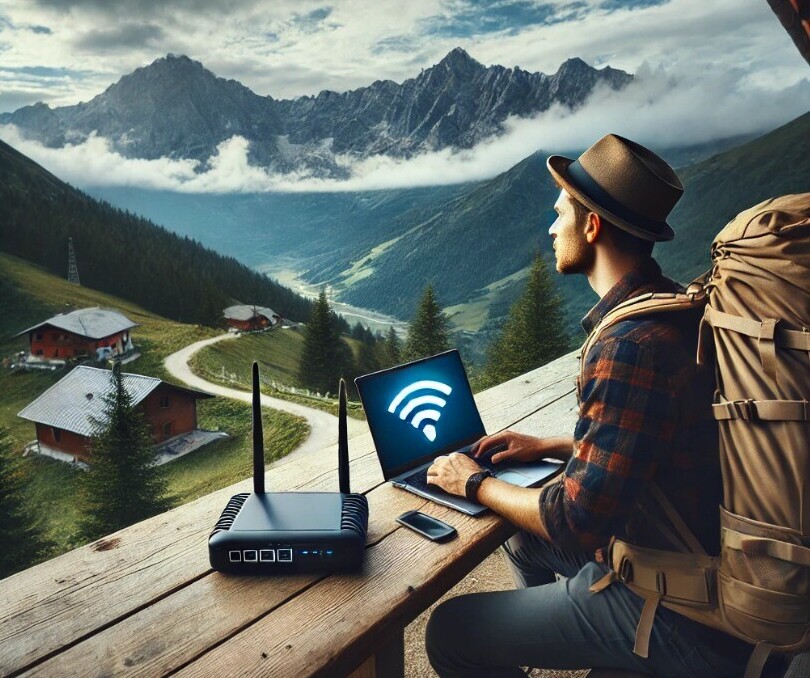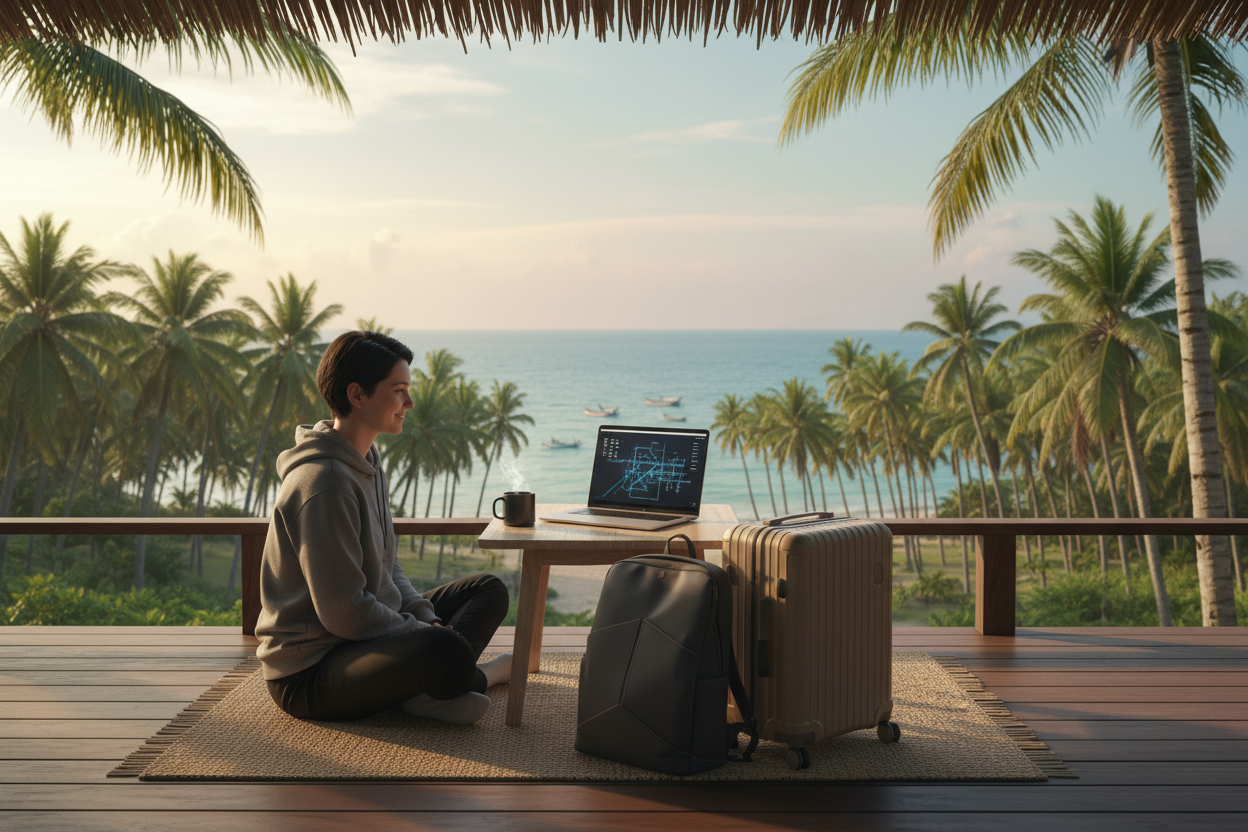This post contains affiliate links and I may earn commissions if you make a purchase.
Being a digital nomad is like having a passport to both work and explore the world simultaneously. It’s the dream for many, offering the chance to set up your office anywhere—from a cafe in Paris to a beach hut in Thailand.

What draws people in usually revolves around the freedom it promises. Forget the morning commute, daily office grind, or fixed schedule. Instead, there’s the flexibility to work in spurts between sightseeing or adjust your hours to fit in a tour of the local museum. This lifestyle can particularly appeal to freelancers, remote employees, or entrepreneurs looking to break the shackles of conventional office routines.
However, the shift towards this way of living isn’t solely about personal freedom. There’s a growing trend driven by the digital transformation of many businesses. More companies are embracing remote work environments, making it feasible for employees to work from almost anywhere with a good Wi-Fi connection. This opens up global job markets for talent, which wasn’t an opportunity available not too long ago.
Though it sounds idyllic, it’s crucial to recognize how this lifestyle shift can influence one’s professional and personal development. It invites a whole new way of balancing work-life boundaries and requires a mindset adaptable to constant change.
For those contemplating this path, delving into the digital nomad life requires not just eagerness to travel but planning and introspection on both capabilities and motivators. This isn’t merely packing a laptop and hopping on a plane—it’s about evaluating how this lifestyle fits into or disrupts your overarching life goals.
The Isolation Conundrum

Jumping from one location to another might sound exhilarating, but it can soon become a lonely journey. The constant movement makes it tough to ground yourself in personal relationships. Friends and family often become voices through a screen rather than present companions.
This lifestyle comes with its unique set of mental health challenges. The lack of a stable support system is a reality many don’t anticipate. It’s easy to overlook how important regular face-to-face human connections are until they’re missing entirely.
Building or maintaining a community can feel like a game of musical chairs. By the time you start to establish connections in one place, it’s often time to move again. The transient nature of the digital nomad lifestyle means setting down roots becomes almost impossible.
For those finding themselves struggling with feelings of isolation, virtual communities or local nomad meet-ups can offer a temporary remedy. Reaching out and connecting with fellow travelers or locals can make a significant difference, but it requires intentional effort and a willingness to step out of your comfort zone.
We can’t underestimate the need to balance exploration with meaningful connections. Creating consistency through regular calls with loved ones or maintaining a personal routine amidst dynamic surroundings is crucial to counteract the solitude.
Navigating Financial Instability

Constant travel can wreak havoc on financial stability, a fact that often catches aspiring digital nomads off guard. Income can become unpredictable, with money flowing in peaks and troughs depending on the type of work and its availability.
The costs associated with this lifestyle might outweigh what one initially anticipates. Flight tickets, accommodation, and everyday expenses can vary drastically from place to place, sometimes swinging wildly between affordable to unexpectedly steep. Not to mention the hidden costs like visas, equipment repairs, or emergency expenses that can crop up suddenly.
The lack of traditional workplace benefits compounds these issues. Health insurance, retirement savings, and paid leave are often non-existent when you’re freelancing or contracting, adding another layer to financial anxiety.
Creating a budget that accommodates for the unexpected helps manage these challenges. Setting aside an emergency fund and diversifying income streams can provide some cushion. It’s also beneficial to work out potential expenses in advance when planning your next destination to avoid nasty surprises.
Staying financially savvy means keeping a close eye on exchange rates and using tools like budgeting apps to track spending. Adapting to local living expenses and finding cost-effective solutions for transport, accommodation, and food might be a continuous experiment, but it’s an essential skill for maintaining this way of life.
Legal and Administrative Hurdles
 Venturing around the globe as a digital nomad sounds liberating, but it’s a path strewn with legalities that can trip you up if you’re not mindful. Visa requirements are a constant chore. Each country has its own rules, and staying compliant means doing your homework well in advance. Some places offer digital nomad visas, but they come with stipulations that need careful consideration.
Venturing around the globe as a digital nomad sounds liberating, but it’s a path strewn with legalities that can trip you up if you’re not mindful. Visa requirements are a constant chore. Each country has its own rules, and staying compliant means doing your homework well in advance. Some places offer digital nomad visas, but they come with stipulations that need careful consideration.
Tax obligations add another layer of complexity. Differences in tax laws across borders can be overwhelming, and it’s critical to ensure you’re not unintentionally evading taxes. Consulting with a global tax expert or an accountant knowledgeable in international earnings can help you navigate these intricate waters.
Staying on the right side of the law isn’t just about taxes or visas. It involves understanding work permits and local regulations that might impact your ability to earn a living legally. While remote work allows geographical flexibility, it doesn’t exempt you from abiding by the local legal framework.
Flexibility often walks a fine line with legality in this lifestyle, and striking the right balance is key. Prioritize researching legal obligations before moving to a new country, and keep all relevant documents organized and accessible. Setting reminders for visa renewals or tax filing deadlines can prevent unwanted fines or complications.
Incorporating a routine check of each destination’s legal landscape into your planning process is invaluable. This foresight shields you from unforeseen disruptions and lets you focus more on the enriching facets of being a digital nomad.
Balancing Work and Leisure

Finding the sweet spot between work duties and leisure activities can be tricky when you’re a digital nomad. The line between what’s work and what’s personal time can blur as your office moves from one intriguing locale to another.
Constantly switching environments keeps experiences fresh but also disrupts routines. Without a stable base, sticking to productive habits takes effort. It’s easy to get sidetracked by the lure of new adventures or the demands of an inconsistent workload.
Work creeping into personal time is a common problem for nomads. It can lead to longer work hours without the structured breaks or boundaries that a traditional workplace affords, and finding the discipline to switch off can be challenging.
Establishing a daily routine helps. Blocking out specific time for both work and exploration fosters a balance, letting you enjoy each aspect without sacrificing the other. Experiment with time management techniques like the Pomodoro Technique or set specific goals for each day to maximize productivity while still making room for leisure.
Ensuring you have a designated space, whether it’s a local co-working spot or a quiet corner of your accommodation, can also minimize distractions. Separating work time from personal time each day can prevent burnout and help maintain mental clarity.
Remember that embracing flexibility is a part of this lifestyle, but setting boundaries is equally critical in ensuring both work and play are fulfilling experiences.
Health and Wellness Challenges

Being constantly on the move poses unique challenges to maintaining a healthy lifestyle. Without a stable routine, it’s easy for fitness and wellness habits to fall by the wayside. Finding time and motivation to exercise can be tough when you’re constantly adjusting to new time zones and environments.
Good healthcare isn’t always a given. Access can be limited depending on where you are, and language barriers can complicate medical visits. It’s crucial to prepare for these scenarios by researching healthcare options in each destination ahead of time.
Travel fatigue is another hurdle that’s often underestimated. Jet lag and long travel days can sap energy, making it hard to stay on top of both work and leisure tasks. The toll of irregular sleep patterns shouldn’t be overlooked, as consistent rest is vital for physical and mental health.
Building a routine that includes regular exercise, balanced meals, and sufficient sleep helps keep wellness in check. This could mean packing travel essentials like a yoga mat or using fitness apps that guide on-the-go workouts.
Having a strategy for accessing medical care ensures you’re not caught off guard by health issues. Consider investing in travel insurance with adequate health coverage and make a list of clinics or pharmacies available in your destination.
To mitigate travel fatigue, planning transitions between regions with an eye on recovery time can make a difference. Scheduling downtime after a long journey helps your body adjust and stay resilient.
Connectivity and Infrastructure Dependency

Staying connected is the backbone of the digital nomad lifestyle. A reliable internet connection is essential for work, communication, and daily living, yet not all destinations offer the same quality or speed. You might find yourself restricted by limited or expensive plans.
Managing work efficiently when connectivity falters requires resourcefulness. Backup plans like local SIM cards, portable hotspots, or committing to work in public Wi-Fi areas only come in handy when planned ahead. Keeping a list of reliable cafes or co-working spaces that come highly recommended by fellow travelers often solves this hassle.
Receiving mail or packages becomes an intricate operation, too. In some countries, mail services may be unreliable or prohibitively costly. Exploring digital solutions or using services that forward mail to where you are currently staying can untangle these complications.
Over-dependence on co-working spaces and cafes isn’t just about internet access. It’s also about having a conducive work environment that fosters productivity. Yet, not all places offer comparable resources or atmospheres. Being adaptable and creating a comfortable setup with noise-canceling headphones or ergonomic tools whenever possible helps.
Balancing the need for connectivity with the desire for remote, scenic locations means sometimes sacrificing tranquility for technology. It’s a regular dilemma for digital nomads, necessitating a backup plan for unforeseen connectivity issues to maintain work continuity.
The Emotional Aspects of a Nomadic Life

Constantly changing locations might seem like the ultimate adventure, but it brings unique emotional challenges. Forming long-term connections with communities or even with the places themselves can become difficult, leading to feelings of detachment.
The impermanence inherent in this lifestyle creates a sense of rootlessness. The lack of a ‘home’ base is a common sentiment echoed by digital nomads, often leaving them yearning for a sense of belonging. As exciting as travel is, it can also nurture a quiet longing for stability that can go unaddressed.
While the flexibility of this lifestyle is unparalleled, the emotional toll can sometimes surprise those unprepared for the constant change. Balancing the thrill of new experiences with the natural human desire for consistency is crucial.
Finding ways to maintain emotional well-being starts with acknowledging these feelings and addressing them head-on. Establishing a routine that includes video calls with family or friends, keeping a journal, or participating in online communities tailored for digital nomads can create a surrogate network of support.
Exploring more extended stays in places that resonate with you allows for deeper connections with the local culture and people, quelling the sensations of transience. Periodically returning to familiar places can also provide the comfort of familiarity amidst the chaos of travel.
Being a digital nomad means embracing the unpredictability while also ensuring self-care practices are in place to handle the emotional ebbs and flows.
Conclusion
In conclusion, the digital nomad lifestyle is undeniably alluring, offering a blend of work, travel, and freedom that can reshape your life in remarkable ways. However, as with any journey, it comes with challenges—from financial instability and legal hurdles to the emotional weight of constant movement. Balancing work, wellness, and personal connections becomes a delicate dance that requires careful planning, adaptability, and a solid sense of self.
If you’re serious about taking the leap into this lifestyle, remember that it’s not just about where you can go but how well you prepare to manage the ups and downs along the way. Stay financially savvy, nurture your mental and physical health, and build a support system that can travel with you, even if only virtually.

Ready to start your digital nomad adventure? Whether you’re freelancing or looking to dive into affiliate marketing as your pathway to freedom, I highly recommend checking out platforms like Wealthy Affiliate or Affilorama. Both are excellent resources to help you build a sustainable online income and turn your dreams of a location-independent lifestyle into reality.
For even more insights, don’t forget to read The Future of Affiliate Marketing: Trends and Predictions to stay ahead of the curve in this exciting space!




Leave a Reply